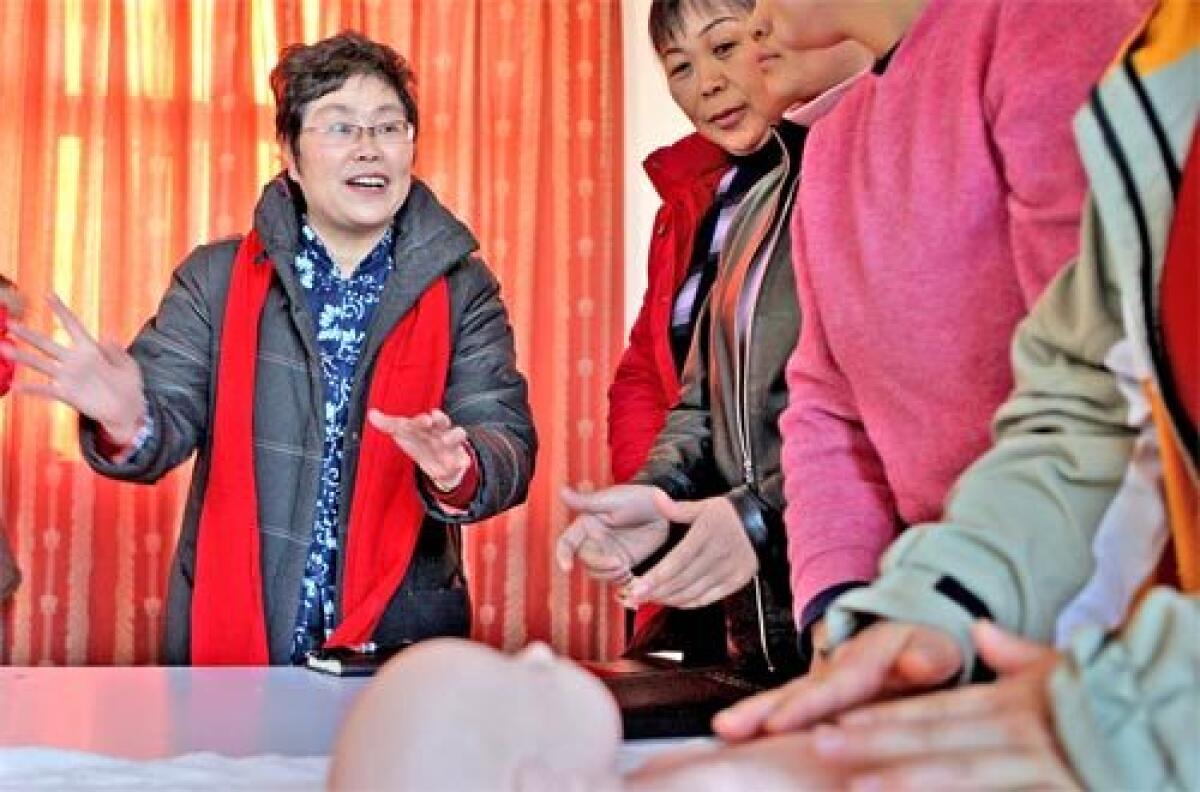A voice for rural women of China

BEIJING — Xie Lihua’s parents wanted a boy. But on the day Xie was born in a poor village in rural Shandong province, her mother learned she had given birth to a second daughter.
She wept in anger. And she slapped her new baby.
“Another girl!” she cried.
The year was 1951. Girls were considered a worthless commodity in an agrarian society that relied upon the strength of young men to flourish. Xie grew up knowing her place -- as a handmaiden to her younger brother.
“My sister and I knew that all the good food went to him -- when he was done, then we could eat,” she recalled.
Decades later, the plight of women in rural China is in many ways even worse. The world’s most-populous nation enforces a strict one-child policy to control its population growth. With more limited opportunities to have children, boys are more idolized than ever.
But the little girl once groomed as a second-class citizen is tired of such insults.
Today, Xie is a fierce activist for women’s rights, working to inspire a quiet revolution. She wants to show a dominant male culture that the nation’s women deserve respect, and are equals.
As important, she is trying to convince the women themselves.
Xie is the founder of the groundbreaking Rural Women magazine, a crucial emotional outlet for generations of peasant women. Each issue includes a lengthy series of readers’ letters, a sort of chat room for far-flung villagers too poor to own computers.
Although urban women have made strides toward equality, thanks to better education and opportunities within a growing white-collar workforce, rural women are often stuck in a harsh lifestyle unchanged from an earlier era.
“I tell them their life is the equal of any man. They were not born unequal -- society made them this way,” Xie said. “They just need opportunities to obtain their rights.”
Three of four Chinese women -- more than 450 million -- still live in the countryside, where rigid social customs breed loneliness and abuse.
Domestic violence rates are high. Each year 150,000 women commit suicide in rural China -- the only place on Earth where more women kill themselves than men, according to the World Health Organization.
Xie’s readers are country women taught to refer to male spouses not as husbands but masters. They inhabit a world where the emphasis on bearing sons is so strong that women bear names such as Zhaodi (“looking for a little brother”) and Aidi (“loving a little brother”).
Along with her 14-year-old magazine, Xie founded the Cultural Development Center for Rural Women, China’s first nongovernmental organization focused on women living outside the city.
She has sponsored programs in literacy training and suicide prevention, as well as some aimed at increasing women’s political participation. She dispenses micro-loans for enterprising rural women.
These days, she focuses on the plight of China’s largest underclass -- the millions of women who leave the countryside as migrant workers -- and especially on abduction and trafficking schemes that enslave women as prostitutes.
She runs a hotline for battered spouses and women unfairly laid off from jobs and has pressured the government to devise more specific legal protections from sexual harassment. She seeks a minimum salary and basic insurance for domestic workers who are not covered under the nation’s labor laws.
Her efforts have empowered multitudes, including rural women who have sought their fortunes in the city, such as the factory worker who challenged her company after it stopped paying her, and the physically abused waitress who sued her employer.
“Xie Lihua’s magazine was the first that gave rural women any real voice,” said Joan Kaufman, a former Ford Foundation program director in China who is now at Harvard’s Kennedy School of Government. “She and others helped put the issue of domestic violence out there for people to begin talking about.”
Xie’s critics say she embarrasses China. Before one international trip, Xie was warned about bad-mouthing her homeland. “There’s no minor thing in diplomacy,” a party official warned. “You will be responsible for anything you say abroad.”
But Xie is unbowed. At 56, she wears traditional Chinese blouses along with Western bluejeans. She continues talking to the Western press and anyone else who will listen. She has risked much with her fight, including the harmony in her own marriage.
“If I am a troublemaker, then so was Deng Xiaoping and his open-door policy,” she said. “If there is no change, even though it is painful, then there is no progress.”
Xie Lihua first realized that widespread changes were possible in China during the 1960s Cultural Revolution. But she believed the Red Guard armies that beat intellectuals got it all wrong.
As head of her secondary school Red Guard committee, she balked at flogging her teachers in public. By then, she had left her village and moved to Beijing, and she began thinking about how to refocus the misplaced zeal of Mao Tse-tung’s new revolution.
Mao had proclaimed that “women hold up half the sky,” meaning they were capable of performing their share of work. Xie believed women also deserved equal rights as part of the bargain.
Years later, she got her first chance to speak out.
While working as a reporter for a publication called China Women’s News, she traveled to Hebei province to profile a woman who cared for her older disabled husband.
The woman had been cited by the government as a rural role model. But Xie found a young wife treated like a slave, who endured her situation because she had been taught that it was her destiny to serve men.
“This woman wasn’t a role model,” she said. “She was a victim.”
Her story challenged what she called “feudal ignorance.” The piece triggered a storm of letters and a debate over women’s role in rural culture that raged for months.
In 1993, the China Women’s News managers encouraged staffers to start their own magazines dealing with women’s issues -- ventures that could be self-sustaining, without government aid.
Xie founded Rural Women Knowing All magazine. She later shortened the name. She charged 40 cents, about the price of a bowl of noodles, but made it free to the poorest women.
Her peers ridiculed her, referring to her project as a “rustic ugly duckling” for its name and content.
The first months were difficult. Xie wrote and edited the first two issues by herself. Her husband questioned her devotion to rural female strangers.
But her ugly duckling not only thrived, it also broke new ground.
Readers discussed sex, love and marriage. Trapped women wrote that they longed for divorce and wanted to start their own businesses.
Xie published a collection of letters detailing love stories and fantasies harbored by readers. She called it “The Emotional World of Rural Women.” Men bought the magazine as well. Some even wrote letters, explaining the male viewpoint on certain issues.
The magazine highlighted the harsh realities of rural China, where the suicide rates are triple that of the city. About 80% of the deaths are the result of conflicts between husbands and wives, she says.
In 1996, the magazine offered readers the equivalent of $12 for accounts of women who had killed themselves.
Xie ran regular profiles of the suicides, along with a psychiatrist’s analyses.
Research showed that many victims swallowed pesticides out of despair over abusive marriages or hopeless lives with domineering in-laws, with whom many come to live after marriage.
They also endured forced abortions. Chinese law allows rural families to have a second child if the first is female. Women who become pregnant with a second girl face overwhelming pressure to abort in a country where such procedures are legal.
Government officials criticized the magazine, saying its campaign was overblown. But Xie would not let up, and the government backed off, allowing her to become a voice for women.
Today, the publication offers tips on having safe and fulfilling sex, and how to find jobs in the city. Columns exhort women to report spousal abuse.
“The rural thinking is that it’s a woman’s fault if she is beaten,” Xie said. “She’s not trying hard enough to please her master.”
Still, her hotline workers discourage women from seeking divorce, counseling them to be realistic about their husbands. “Women can’t expect too much from their husbands,” she said. “The more they expect, the more disappointed they will become.”
For a time, Xie’s own home life reflected that philosophy. Tensions grew with her husband, who wanted a more traditional wife. Xie wanted more support. They fought.
Xie is lucky. In time, her husband came around. “He said the biggest help he could give me was not standing in my way,” she recalled.
Today’s China, she says, has become more tolerant of women charting their own destinies, “something we couldn’t have imagined even 10 years ago.”
There are setbacks. Like the former country girl who committed suicide after she was raped by a man who employed her as a domestic worker. Xie blames herself for the tragedy.
“Sometimes I think maybe I am a troublemaker,” she said. “If that girl had stayed in her village, she would still be alive. Maybe it’s not good to encourage everyone to come to the city.”
The moments of self-doubt are few. Xie is too busy.
“Rural women in China are everyone’s somebody,” she said. “They’re somebody’s wife, somebody’s mother, somebody’s daughter-in-law. I encourage them to follow one simple rule:
“You are yours. You are not anybody else’s.”
More to Read
Sign up for Essential California
The most important California stories and recommendations in your inbox every morning.
You may occasionally receive promotional content from the Los Angeles Times.











